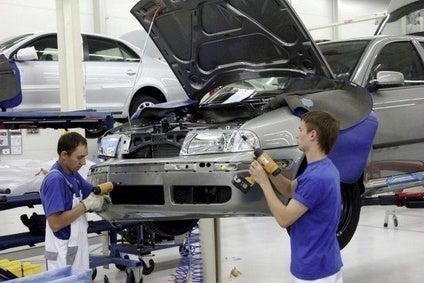
Volkswagen is to cut shifts and 150 workers at its Russian car assembly plant in Kaluga, the automaker said.
The move is to cut costs in the market downturn, Reuters reported. It follows moves last week by General Motors which is closing a plant and Nissan which is cutting output.

Discover B2B Marketing That Performs
Combine business intelligence and editorial excellence to reach engaged professionals across 36 leading media platforms.
“In the first months of 2015 the Russian auto market continued to feel the impact of a weak economy, significant price increases and high interest rates. We don’t expect that to change in coming months,” Volkswagen told Reuters by email.
The plant in Kaluga, south of Moscow, would work four days a week from April to July this year and, from May, the number of shifts would decrease from three to two.
As part of measures intended to help the company adapt to the current economic environment, production would be suspended for two weeks on 5-8 May and 12-15 May, VW said.
The company told Reuters it would also not renew contracts with at least 150 employees and would offer some others the chance to move either to the new parts warehouse in the Moscow region or an engine plant – both are scheduled to open later this year.
It will also offer compensation packages to employees who will give up their jobs by mutual agreement.
VW’s Russian sales fell 40% year on year in January-February 2015 while the broader market was down 32%, Association of European Businesses cited by Reuters showed.
But the automaker said its Russian investment plans were intact with the construction of the engine plant and the parts warehouse on schedule.
“The Russian market still has a significant growth potential long-term,” it said in the statement.
The Kaluga plant switched from simple SKD assembly to more complex, ‘full cycle’ CKD production in 2010 as Russian automotive industry policy demanded more use of local labour, materials and parts.
From just-auto‘s Product Life DataBase (subscribers only): VW Kaluga output past, present, planned






